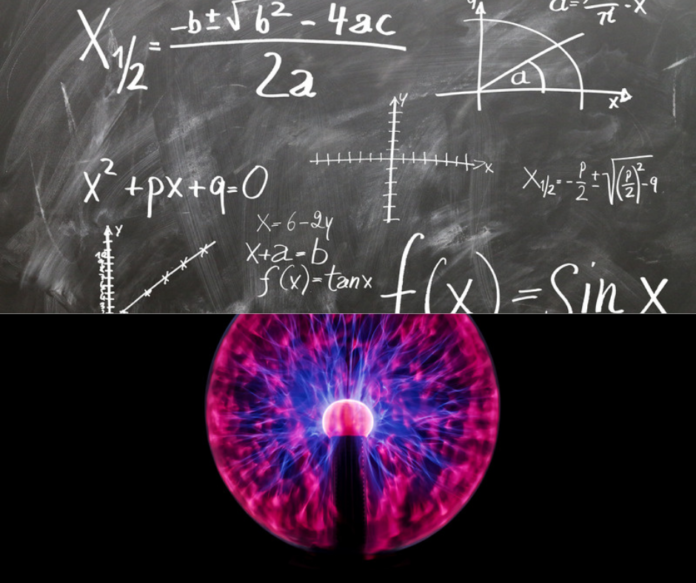It was 1666 in England. There was Plague all around. Students were sent home to avoid the epidemic. On a summer day, a bright young man who studied at the University of Cambridge was sitting under a tree at a garden in Lincolnshire. Suddenly, he saw an apple dropping. A question flashed in his mind: Why does everything move downward, rather than sideways or upwards? He later found the answer to his question in the Law of Universal Gravitation, which he discovered. He also found the three laws of motion and infinitesimal calculus. He was Sir Isaac Newton.
His notes, which he entitled the Quaestiones Quaedam Philosophicae (Certain Philosophical
Questions), reveal that he had discovered a new idea of nature that provided the framework of the Scientific Revolution. He inspired people of those times to question everything around them. It might seem usual to us, but people of those times had fixed beliefs. They thought that they knew everything through their religious books and churches but, this notion changed forever in the Scientific Revolution. Like Newton, many scientists in those times had discovered and invented a lot that is the foundation of the building of knowledge we have today.
Now, there are a few questions:
What is the Scientific Revolution? When did it happen? What was the condition of people before the revolution? What were its causes? What are its major incidents (significant discoveries and inventions)? How and in what ways has it affected the lives of people (impacts of the revolution)? And, How did it change the world and the outlook of people in the world forever? We are now going to find the answers to these questions one by one.
Definition of Scientific Revolution:
According to the Oxford Dictionary, the word Scientific means connected with science, and the word Revolution means a complete change in methods, opinions, etc., often resulting from progress. So, the compounded word Scientific Revolution means a complete change in methods, opinions, etc., often resulting from progress in science.
It refers to the remarkable growth of human power over the last 500 years resulting from the discoveries and inventions of modern science. These discoveries and inventions are what happened during the scientific revolution and progressed science.
Years of beginning and end:
The Scientific Revolution started in 1543 with the publication of the book- On the Revolutions of the Heavenly Spheres, written by Nicolaus Copernicus, towards the end of the Renaissance period. It ended in 1687 with the publication of the book- Principia: The Mathematical Principles of Natural Philosophy, written by Sir Isaac Newton.
Location:
It happened in Europe but had measurable effects on people from other countries in many aspects of their life.
Before the revolution:
In the year 1500,
● The population of humans was about 500 million. The total value of goods and services
produced by humans is estimated to be 250 billion Dollars. The number of calories
consumed by humanity in a day was 13 trillion. The annual per capita income averaged 550
Dollars. Only a few cities had over 100,000 inhabitants.
● No human had circumnavigated the earth. It happened in the year 1522 by Ferdinand
Magellan.
● Also, no one had seen a microorganism. It was first seen in 1674 by Antonie van
Leeuwenhoek.
Condition of homes of people:
● People used wood, mud, and straw to make buildings.
● Only candles and flickering torches were available to avoid darkness at night. The cityscape was black.
The above facts reveal that people lacked a better lifestyle. It was due to fewer investment
and developments in science.
Condition of Education:
● Authorities like Catholic Church Officials and ancient Greek writers guided most educated
people at those times. It means that ancient texts and traditions taught people.
● Until the early modern period, kings and emperors gave money to education and scholarship
to preserve existing qualities and not acquire new ones.
● Traditions formulated theories in terms of stories and not mathematics.
Notions about science:
● Premodern traditions of knowledge such as Islam, Christianity, Buddhism, and Confucianism
asserted that the great gods, or the one almighty God, or the wise people of the past
possessed all-encompassing wisdom, which was revealed to them in scriptures and oral
traditions.
● It was unimaginable that their religious books comprising the Bible, the Quran, or the Vedas
were missing out on something that humans could discover.
The above points reveal that people had wrong thoughts about science. Their belief was the
problem in their way to discoveries and inventions.
Accepting ignorance is the starting point in the journey of knowing more." It gives a purpose
for learning. If a person thinks that he or she knows everything. Then, he or she will stop working to
conceive more because there would be no need for that.
Causes of the revolution:
● Admitting ignorance: The root cause that launched the revolution was the admittance of
ignorance. European scholars acknowledged that their theories were not perfect. There were
necessary things that they did not know. For example, Europeans realized the insufficiency
of medieval experimental methods. So, they felt the need to devise new approaches (some
of which we use today).
● Thinking scientifically: Europeans had values, myths, judicial apparatus, and socio-political
structures. They thought and behaved scientifically before enjoying technological
advantages.
● Ambition to explore, conquer and learn: Europeans had an unparalleled and insatiable
ambition to explore and conquer. At the end of the fifteenth century, Europe became a
hothouse of important military, political, economic, and cultural developments. Consequently, they had access to information possessed by other countries. They also believed that acquiring knowledge is always good. This access and belief enabled them to learn more. For example, Europeans accessed the endowment of Greek, European, and Middle Eastern scientific philosophy. Then used it as a starting point for disproving or building the theorems.
● Proper financing in scientific research: Scientific research can prosper only in association
with some ideology or religion. So, at the time of the revolution, the purpose of funding
scientific studies was to attain some political, economic, or religious goals. These goals
consisted of helping emperors and army officers to win wars, governing well, getting good
health care, etc. Political and economic institutions provided resources to achieve these
goals. In return, scientific research provided powers to obtain new resources, some of which were invested in research again. This loop between science, empire and, capital fueled the revolution. For example, In the sixteenth century, Kings funded geographical expeditions to gain information that would help them conquer new countries and set up new empires.
● The centrality of mathematics: Alliance of members of the mathematical communities with seventeenth-century scientists, philosophers, and astronomers increased usage of
mathematical tools to connect observations into comprehensive theories.
● Publication of works: Many institutions helped to authenticate science as a field by providing an outlet for publishing works of scientists. One of those institutions was the British Royal Society. It inspired more scientists and simplified the spread of knowledge.
During the revolution:
Significant discoveries and inventions in different branches of Science:
Astronomy:
● Nicolaus Copernicus propounded the heliocentric theory in 1543. In this theory, he
positioned the sun near the center of the universe, motionless, with Earth and other planets
rotating around it in circular paths with uniform speeds. This theory needed a few
corrections. Those corrections were made by scientists- Tycho Brahe, Johannes Kepler, and
Galileo Galilei.
● Johannes Kepler discovered two planetary laws of motion in 1609. He stated the third
planetary law of motion in 1618.
● Galileo Galilei designed his telescope and made several important astronomical discoveries like the phases of Venus, the moon’s surface, the four largest moons of Jupiter, the rings of Saturn. He also made detailed observations of sunspots.
● Isaac Newton developed ties between astronomy and physics through his law of universal
gravitation.
Physics:
Mechanics:
● Archimedes developed the foundations for a new physics that was highly mathematizable.
He discovered the law of free fall, derived the parabolic path of projectile motion.
● Christiaan Huygens formulated the laws of conservation of momentum and kinetic energy
(valid only for elastic collisions).
● Sir Isaac Newton developed the concept of force, the law of universal gravitation, the three laws of motion. His physics led to the conclusion that the shape of the earth is not precisely spherical but bulged at the equator. Using this fact, he showed how the axis of rotation would
change its direction.
Optics:
● Rene Descartes derived the laws of reflection and refraction using mechanical analogies.
He also explained the double refraction phenomenon.
● Newton demonstrated that white light is a mixture of separate beams of coloured light and
explained the way prisms produce spectra of colours from white light.
Electricity
● Dr. William Gilbert discovered that many substances other than amber, sulphur, etc.,
manifested electrical properties.
● Robert Boyle stated that the electric attraction and repulsion acting across vacuum would
attract light substances, indicating that the electrical effect did not depend on the air as a
medium.
● Otto von Guericke invented an early electrostatic generator.
Chemistry:
● Georg Agricola published his book named De re metallica. This book describes the highly
developed and complex processes of mining metal ores, metal extraction, and metallurgy of the time.
● Robert Boyle’s book named The Sceptical Chymist, presents his hypothesis that every
phenomenon was a result of collisions of particles in motion. It has the earliest modern ideas of atoms, molecules, and chemical reactions.
● Boyle denied limiting the chemical elements to only earth, fire, water, and air. He also
discovered Boyle’s Law that describes the inversely proportional relationship between
pressure and volume of a gas, if the temperature is kept constant within a closed system.
Earlier, Chemistry was seen as a part of medicine or alchemy. He pleaded to give chemistry
the status of a science.
Biology and medicine:
● Vesalius’ book named De humani corporis fabrica, was a ground-breaking work of human
anatomy. It emphasized the priority of dissection.
● William Harvey demonstrated that blood circulates, using dissections and other
experimental techniques. His book named De Motu Cordis made a detailed analysis of the
overall structure of the heart, the arteries, etc.
● Pierre Fauchard started dentistry science.
● Antonie van Leeuwenhoek constructed powerful single lens microscopes and made
extensive observations that he published around 1600, opening up the micro-world of
biology.
New mechanical devices:
● John Napier introduced logarithms which later became a strong mathematical tool.
● Blaise Pascal invented the mechanical calculator.
● Evangelista Toricelli invented the mercury barometer.
After the revolution in the context of its impacts:
Today,
● The population of humans is about 7 billion. The total value of goods and services produced
by humans is estimated to be 60 trillion Dollars. The number of calories consumed by
humanity is 1,500 trillion. The annual per capita income is 8800 Dollars.
The immense difference in values of the same properties of today and the year 1500 is
evident from the mentioned data. This difference must be due to a force that accelerated the values of properties from its initial values. This force was the development of modern science.
Impacts just after the revolution that led to this development:
How it changed the world forever:
● The use of experimental methods and reasoning paved the way for discoveries and
inventions. At that time, blossoming in branches like medicine, mechanics, optics,
mathematics, and astronomy took place. These enriched people’s quality of life. They started
using different machines for their works. It saved their time and energy. It motivated people
to learn more. So, they read up more about distinct topics that led to more useful scientific
ideas.
● The development in medical science prevented the deaths of people, especially women and, children that increased population.
How it changed people’s outlook of the world forever:
● People started questioning everything and tried finding answers to their questions using
observations and logic, rather than accepting an answer blindly by faith or assumption. It was a change in their way of thinking. A new perspective of nature was born by substituting the Greek view that had dominated science for almost 2,000 years.
How it impacted the Industrial Revolution:
● The laws of nature that were discovered during the revolution were used in the Industrial
Revolution to manufacture products as they explained many natural processes and physical
properties of materials.
For example, Factories used an approach in which small parts of a problem were made. The
problem was solved by solving those small parts and integrating them. This approach was
developed during the revolution.
To sum up, the scientific revolution was the era of shifting focus from god to power of reasoning. It was a revolution of knowledge, but above all, it was a revolution of ignorance. The great discovery that launched it was that humans do not know the answers to their most important questions.
In addition, investment in science by leaders and emperors to fulfill their ambitions was a crucial cause of the revolution. Developments in astronomy proved that we are not the center of the universe but a tiny part. Also, developments in medicine, physics, mathematics, and chemistry improved our way of living.
We still do not know the answers to many questions and, we are on our way to find their answers.
We can learn to accept ignorance from the revolution. It will make us curious to know more about our nature. The knowledge we will gain to feed this curiosity will further improve our way of living compared to the present time.
Fewer people questioned everything around them during the revolution as Newton did. But today most humans do this, and it is the impact of the scientific revolution.










